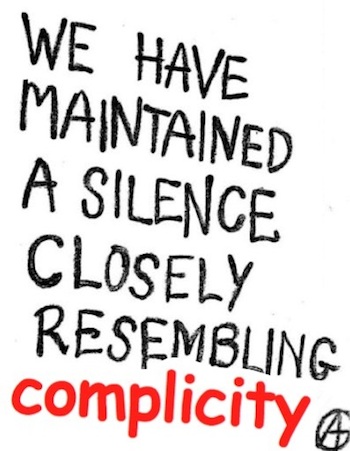Recent events have seen me revisiting a theme (or meme?) of this blog — and central to my own thinking:
WHY SHOULD one speak up about perceived wrongdoing?
Let me start by saying this: Life is complicated.
Sometimes people and things can appear to be one thing on the surface but as you look closer, you begin you notice cracks in the façade or artifice. You may detect inconsistencies in the narrative, or note a dichotomy between a person’s words and deeds, or be subject to broken agreements … even being strung along with excuses for non-performance.
You may start to experience a feeling of dissonance.
Later, you might even reach a point of seeing the person or situation as 100% the opposite of your original impression. It’s happened to me. When it does, the chain of events leads one to reach certain conclusions.
But back to the question, Why speak up? Why not just quietly go about your business, live and let live, look the other way and let the chips fall where they may? Why open yourself up for criticism as um, well … a critic? Why do it?
I’ve discussed part of it before: I’m sick of seeing the effect on the victims of certain types of ‘sales’ operations. It’s tragic in some cases … and just downright wrong in others.
I also personally think that the decision to remain SILENT in the face of what you perceive as wrongdoing is a perverse mistake and causes a ‘social harm’. (I’m not going to use the word ‘sin’ because it’s loaded with baggage, but, hey, if it fits for you… ) I’ve expanded on this aspect in another discussion prompted by a claim that ‘God told me to cover sin’ … on my way to drawing conclusions.
There’s another very important reason why I think people who SEE what’s going on have a duty to blow the whistle. It’s this:
Complicity
In November 1982, a 22 year old anarchist by the name of Neil Roberts detonated a bomb in the lobby of the Wanganui Police Computer Centre, killing himself and inflicting some ‘non-operational’ damage to the reinforced glass doors and foyer. Earlier that day he’d scrawled a message on a wall in the town:
‘We have maintained a silence closely resembling stupidity.’
Those are challenging, uncomfortable words, if you let them in.
In my view, if someone has evidence of dodgy dealings (even potentially dodgy) by certain individuals, if one knows they are lying or deceiving, but stays silent — whether out of fear or squeamishness, a desire not to ‘rock the boat’, claims of God’s orders, or worse, because they see a potential profit in it — let me offer THIS adaptation of Neil Roberts’ slogan:
We have maintained a silence closely resembling complicity.
Think about it.
To those of my friends and others who are ‘keeping their heads down’, ‘staying out of it’ or, in some cases, kidding themselves that the particular liar they are working with is ‘not so bad’ — ‘the best of a bad bunch'(?) — or, in their own way, ‘an honest person’, I say (kindly): Get real.
Take encouragement, as I have, from the plucky souls who pipe up and point out the cracks in the artifice. Celebrate and applaud their courage, as I try to do. And, if you can, follow their example. I acknowledge the challenge you face. We all do.
At any time, in my view, you are either a force for good or ill — opposing evil or assisting it:
All that is necessary for the triumph of evil is that good men do nothing.
— Edmund Burke
I know I come across as a sort of zealot at times. I know my views can appear harsh and judgmental — black and white. I know it. Truthfully: I feel an obligation to do the right thing and speak up — to tell the truth as I see it.
And you?



Very nice.
Doing the right thing should never be a hard thing. But for some it is. Not sure why.
I must say Congressman Anthony Weiner of New York’s 9th District has got the right stuff. He knows the difference between the right thing and the wrong thing!
I can’t find a link to it yet – but you will know what I’m talking about when you see it.
[…] or ‘gurus’ etc. At times, for the reasons I explained yesterday in ‘Why Speak Up?‘, I’ve tried to oppose them and sound warnings about them. I even sued one whom I […]
[…] card, um, caught my eye at the Howick Public Library this afternoon. It reminded me of my post: Why speak up? — in part because it assumes a public duty to report crime, or at least share information about […]
[…] in Why speak up I shared… At any time, in my view, you are either a force for good or ill — opposing evil […]
[…] he seems to understand this: Share […]
[…] one of my themes — the need to speak up about wrongdoing… which Hubbard’s very own philosophy expounds […]
[…] ghastly true life story touches on one of my ongoing themes of this blog: Finding the courage to speak up — to blow the whistle on wrongdoing when you perceive it … even if at a […]
[…] my July 2010 post, Why speak up? We have maintained a silence closely resembling […]
[…] who died in an explosion in the foyer of the Wanganui police computer centre (see my post: Why speak up?) and Ernie Abott, we don’t have a common history of political violence, thank […]
[…] believe in supporting and encouraging them. As I have explained, I think the *urge* to tell the truth, despite possible cost or consequences, in the face of likely […]